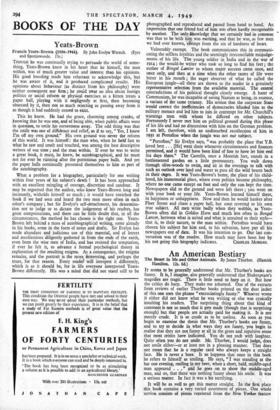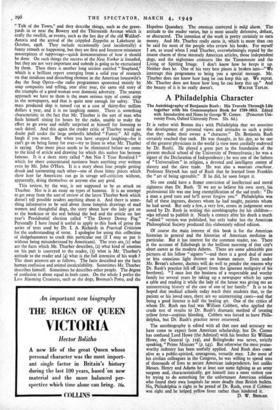An American Bestiary
IT seems to be generally understood that Mr. Thurber's books are funny. It is, I imagine, also generally understood that Shakespeare's tragedies are tragic. There is little need to harp on it. But how the critics do harp. They make me ashamed. One of the extracts from reviews of earlier Thurber books printed on the dust jacket of this one uses the phrase "excruciatingly funny." Whoever wrote it either did not know what he was writing or else was cynically insulting his readers. The surprising thing about that kind of comment is not so much that it gets made (though that is surprising enough) but that people are actually paid for making it. It is not merely crude. It is so crude as to be useless. As soon as you begin to examine the thesis that Mr. Thurber's books are funny, and to try to decide in what ways they are funny, you begin to realise that they are not funny at all in the gross and repulsive sense that most critics have indicated. You do not rock with laughter. Quite often you do not smile. Mr. Thurber, I would judge, does not smile eitheror at least not in a pleasing manner. That does not mean that he is a regular card who always keeps a straight face. He is never a bore. It so happens that once in this book he refers to himself as smiling. He says, " I was standing at the bar one evening, smiling in my beer, when a short, bald, middle-aged man appeared . . ." and he goes on to show the middle-aged man, and us, that there' was nothing funny about his smile. It was a serious matter. In fact it was a bit terrifying.
It will be as well to get this matter straight. In the first place this book contains a very varied assortment of pieces. One whole section consists of pieces reprinted from the New Yorker feature "Talk of the Town," and they describe things, such as the grave- yards in or near the Bowery and the Thirteenth Avenue which is really the twelfth, or events, such as the last day of the old Waldorf- Astoria and the arrival of the crippled Zeppelin at Lakehurst in October, 1928. They include occasionally (and incidentally) a funny remark or happening, but they are first and foremost miniature masterpieces of rapportage—quick demonstrations of how it should be done. On such things the success of the New Yorker is founded, but they are not very important and nobody is going to be excruciated by them. Then there is another long section entitled " Soapland," which is a brilliant report emerging from a solid year of research on that insidious and disturbing element in the American housewife's day the Soap Opera—the radio programmes sponsored mainly by soap companies and telling, year after year, the same old story of the triumphs of a good woman over domestic adversity. The nearest approach we have to them is the more serious type of comic strip in the newspapers, and that is quite near enough for safety. This mass produced slop is turned cut at a cost of thirty-five million dollars a year, and it is no laughing matter. There is something characteristic in the fact that Mr. Thurber is the sort of man who finds himself sitting for hours by the radio, unable to make the effort to go away and mildly surprised at himself for listening to such drivel. And this again the cruder critic of Thurber would no doubt pull under the large umbrella labelled " Funny." All right, laugh if you must. But when you have stopped laughing—for it can't go on being funny for ever—try to listen to what Mr. Thurber is saying. One more piece needs to be eliminated before we come to the kind of article and drawing for which this author has become famous. It is a short story called " Am Not I Your Rosalind ? " which for sheer concentrated nastiness beats anything ever written even by Mr. John O'Hara. It is a story about four people getting drunk and tormenting each other—one of those bitter pieces which show how far Americans can go in savage self-criticism without, apparently, doing themselves or anyone else any good.
This review, by the way, is not supposed to be an attack on Thurber. Nor is it an essay on types of humour. It is an attempt to get away from the sort of review of the latest Thurber book which doesn't tell possible readers anything about it. And there is some- thing informative to be said about those lumpish drawings of mad women and thoughtful dogs, the story about how the lady got on to the bookcase or the seal behind the bed and the article on last year's Presidential election called " The Dewey Dewey Fog." Personally I have found it useful to apply to this book of prose the series of tests used by Dr. I. A. Richards in Practical Criticism for the understanding of verse. I apologise for using this collection of sledgehammers to crack this particular nut (if I may so put it without being misunderstood by Americans). The tests are, (I) what are the facts Which Mr. Thurber describes, (2) what kind of emotion on his part is conveyed to the reader, (3) what is Mr. Thurber's attitude to the reader and (4) what is the full intention of his work ? The short answers are as follows. The facts described are the facts human confusion and animal incalculability. Sometimes Mr. Thurber describes himself. Sometimes he describes other people. The degree of confusion is about equal in both cases. On the whole I prefer the Less Alarming Creatures, such as the dogs, Bosman's Potto, and the Hopeless Quandary. The emotion conveyed is mild alarm. The attitude to the reader varies, but is most usually defensive, defiant, or abstracted. The intention of the work is pretty certainly to earn money. And Mr. Thurber really earns it, which is more than can be said for most of the people who review his books. For myself I am, as usual when I read Thurber, overwhelmingly repaid by the insane charm of these intensely American articles, those independent dogs, and the nightmare creatures like the Tantamount and the Living or Spitting Image. I don't know how he keeps it up. Neither does he. One of his very best pieces is broken into—" We interrupt this programme to bring you a special message. Mr. Thurber does not know how long he can keep this up. We repeat. Mr. Thurber does not know how long he can keep this up." And
the beauty of it is he really doesn't. WALTER TAPLIN.







































 Previous page
Previous page